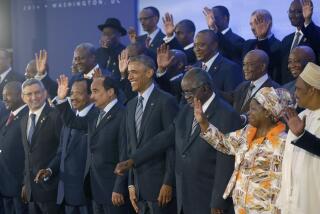U.S. Needn’t Shrink From Durban
- Share via
The United Nations conference against racism will be the most significant forum for the discussion of racial issues on the world stage in a generation, yet even at this late date--the conference begins Friday in South Africa--it remains uncertain whether the U.S. will boycott it. Why? Slavery reparations and other issues.
Secretary of State Colin Powell, who said he would not attend the conference, noted earlier this summer that a boycott would be justified because “getting into slavery and compensation and things of that nature
In his bestselling autobiography, “My American Journey,” Powell eloquently addressed the complex issue of national and international racial problems, and could provide the conference with his indispensable and timely perspective.
There may be no figure in American public life today who is more respected by black and white, Republican and Democrat, rich and poor alike.
A New York Times editorial ill-advisedly agreed with Powell on the reparations issue, saying that this conference “is one of those meetings that make people wonder about the usefulness of the U.N.,” and that it “threatens to dissolve into an unproductive debate” over trivial issues.
Calling the usefulness of the U.N. into question, especially on issues of racial equality, is absurd. Since its founding, the U.N. has played a central role in encouraging the end of colonial rule in Africa and in promoting racial and gender equality worldwide.
In addition, the strong case that has been made regarding the unpaid debt for slavery and colonialism indicates that this is not a trivial issue and that serious discussion of reparations need not dissolve into “unproductive debate.” To the contrary, the conference provides the ideal international forum for addressing the many difficult questions that arise from the suggestion of slavery reparations, including whether the descendants of African slaves are entitled to any form of compensation for their labor, whether public and private entities bear any responsibility for slavery, how to determine and evaluate the extent of African complicity in the slave trade, and whether African claims for debt relief are viable and legitimate.
These are painful and divisive issues that won’t go away. They require vigorous debate and the conference provides the proper forum.
American participation in this debate is crucial. The U.S., in addition to such organizations as the U.N., plays an important leadership role legally, politically and morally in ensuring that the world community moves toward principles of democracy and equality. A boycott of the racism conference would send the wrong signal--that the U.S. is unconcerned about racial issues, or worse, that the U.S. is afraid of serious and candid discussion of its own history. The controversy surrounding the issue of reparations should make U.S. participation an urgent priority.
The conference’s agenda is, of course, much broader than just the topic of reparations, including such diverse issues as trafficking in people, gender discrimination, the plight of indigenous populations, multiethnic states, the protection of minority rights and the intersection of race and poverty. The failure of the U.S. to attend would mean we could neither influence nor learn from the discussions on these topics.
At some point we must be prepared to address issues of racial and gender equality in both national and international arenas. President Bush should follow the lead of countries that have agreed to discuss, or even voluntarily suggested, controversial topics that implicate their own behavior. For example, France has brought to the table the issue of Gypsies even though other European countries are opposed to its discussion, and Senegal wants the problem of contemporary human slavery to be considered.
The U.S. is capable of defending its positions on issues of race relations in America and should not shrink from its responsibility to play an important role in the conference.
More to Read
Sign up for Essential California
The most important California stories and recommendations in your inbox every morning.
You may occasionally receive promotional content from the Los Angeles Times.










